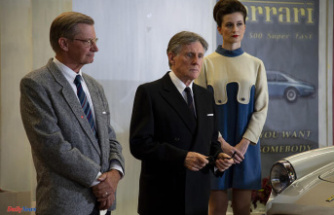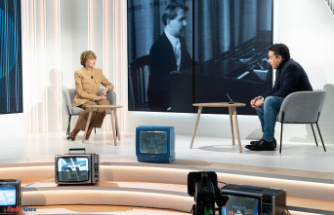In the vastness of life, Grace Dell "Nichelle" Nichols has been many things - dancer, singer, NASA consultant, actress of course, she even wrote a novel - but she was none of them so much, so momentous and, all things considered , in the end probably just as much as Lieutenant Uhura. As any child of the television age knows, Lieutenant Uhura sits on the bridge of the Starship Enterprise as communications officer; With Captain Kirk and the Vulcan Spock, with Bones the doctor and Scotty the engineer, she flies through the endless expanses of space. "The greeting frequencies are open, Captain," is her typical sentence, which is of course highly symbolic for the international understanding of the Star Trek mission.
Nichelle Nichols was 34 when this mission began in 1966 and - this is also part of the general knowledge of television children - the only woman and the only black person at the spaceship controls - and not only Nichelle Nichols and series creator Gene Rodenberry were aware of that, they had also understood Martin Luther King, who went from Memphis to Jackson in the “Star Trek” year 1966 to protest for the Civil Rights Act. For the first time, as King Nichols himself explained, thanks to Lieutenant Uhura, black Americans would be seen on television the way they were meant to be seen every day: "as intelligent, worthwhile, beautiful people who can sing, dance, and fly into space." who are professors and lawyers.”
At the time, Nichols was on the verge of getting out of Star Trek, so for King's sake, she said, she continued at the time - to finally kiss Captain Kirk as Uhura. And here's something else every half-educated TV kid knows: Nichelle Nichols and William Shatner shared their first black-and-white TV kiss on "Star Trek." It is perhaps even more interesting that on the one hand this is correct and on the other hand it is not correct.
First of all: Love was not involved in this kiss, and the episode "Plato's Stepchildren" was not about open frequencies, but rather about disturbed frequencies: Plato's extraterrestrial stepchildren are holding the Enterprise crew against their will and using telekinesis to force them among other things, to that kiss photographed chastely from behind – a scandal calculated by showrunner Rodenberry, which ended up being a bit smaller than expected.
The production company didn't want the kiss and insisted on a kiss-free alternative; However, when Nichelle Nichols and William Shatner sabotaged them in all takes, even the production company apparently didn't care - "Star Trek", hitherto chronically unsuccessful, was already at the end of the decline in season three. So the famous kiss went like the whole series: it only became a legend ex post.
The fact that he was the first American TV kiss between ethnic groups is part of the legend and has long and passionately been refuted - ("Kirk and Uhura's kiss" even got its own Wikipedia entry for it). In fact, William "Kirk" Shatner himself kissed a non-white woman on television with the Asian-born actress France Nuyen back in 1958; Nichelle Nichols, on the other hand, had already kissed (the white) Majel Barrett in episode eight, who plays the nurse Christine Chapel in "Star Trek". (Barrett married Gene Rodenberry in 1969; Nichelle Nichols, who had previously had a relationship with Roddenberry, did not marry him.)
As a matter of honor, however, the kiss story is correct: over the years, the collective memory, which, like the individual, not only deceives but also sorts, has assigned the privilege of being the first to just that black-and-white kiss scene, who also wanted to be the first. "Star Trek" was already the utopia of a diverse future when "woke" was still a widely unknown slang term: That's why Kirk and Uhura's kiss is so important. (And that's why Uhura's initial working name, Sulu, was given to an Asian man on the bridge.)
What is always forgotten about the various origins: Lieutenant Uhura is also the only woman on the bridge of the Enterprise. In terms of identity politics, the series was king, but things didn't go so well from a feminist perspective. Majel Barrett, originally slated to be first officer, was demoted to nurse after the pilot, while Nichelle Nichols' role was all too often limited to opening the channel for her captain. Kirk has, the Trekkies counted, kissed 19 women in three seasons; Uhura was only allowed to squint at the fabulous Spock. Was it love? We do not know it.
Either way: Nichelle Nichols has of course stayed Uhura - a job on the Enterprise was for life for all actors involved. Nichols' voice was heard again in a 1974 animated "Star Trek" series, after which Nichols played Uhura in six "Star Trek" films until 1991 - in a way she is even NASA's diversity advisor in the role of her life hatched; just as William Shatner was of course Kirk when he went into space with Jeff Bezos.
Nichelle Nichols died on July 30, 2022 in Silver City, New Mexico, she was 89 years old. She now has a little time until Lieutenant Uhura is born in 2239.












